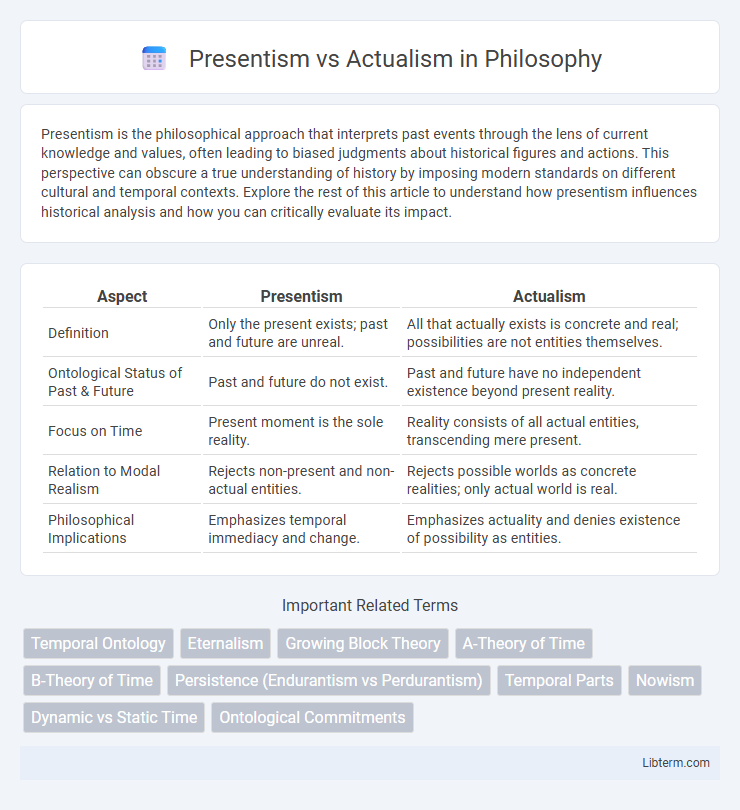Presentism is the philosophical approach that interprets past events through the lens of current knowledge and values, often leading to biased judgments about historical figures and actions. This perspective can obscure a true understanding of history by imposing modern standards on different cultural and temporal contexts. Explore the rest of this article to understand how presentism influences historical analysis and how you can critically evaluate its impact.
Table of Comparison
| Aspect | Presentism | Actualism |
|---|---|---|
| Definition | Only the present exists; past and future are unreal. | All that actually exists is concrete and real; possibilities are not entities themselves. |
| Ontological Status of Past & Future | Past and future do not exist. | Past and future have no independent existence beyond present reality. |
| Focus on Time | Present moment is the sole reality. | Reality consists of all actual entities, transcending mere present. |
| Relation to Modal Realism | Rejects non-present and non-actual entities. | Rejects possible worlds as concrete realities; only actual world is real. |
| Philosophical Implications | Emphasizes temporal immediacy and change. | Emphasizes actuality and denies existence of possibility as entities. |
Understanding Presentism: A Brief Overview
Presentism is the metaphysical view that only present objects and events exist, denying the reality of past and future entities. This perspective emphasizes the primacy of the present moment and asserts that temporal states are constantly changing, with no fixed past or future realities. Understanding Presentism requires recognizing its contrast with Actualism, which allows for the existence of past and future events in a more abstract or modal sense.
Exploring Actualism: Key Concepts
Actualism asserts that only present objects and events truly exist, rejecting the reality of past and future entities as concrete beings. This metaphysical view emphasizes the ontology of what is actual now, grounding existence in the immediate temporal moment. By prioritizing the present's reality, Actualism challenges theories like Presentism, which may allow for a broader or differing temporal ontology.
Historical Roots of Presentism and Actualism
Presentism, rooted in early modern philosophy, traces back to thinkers like Augustine who emphasized the present moment's reality, contrasting with the ancient Greek tradition that influenced Actualism by affirming the existence of past and future entities. Actualism, with origins in Aristotelian metaphysics, holds that only actual, concrete entities exist, rejecting the ontological status of merely possible or non-actual entities. The historical development of these views reflects a profound debate on the nature of time and existence, shaping contemporary metaphysical discussions on temporal ontology.
Core Differences Between Presentism and Actualism
Presentism holds that only present objects and events exist, while Actualism asserts that all actual entities, including past and future objects, exist in some form. A core difference lies in their ontological commitments: Presentism limits existence strictly to the present moment, whereas Actualism maintains that entities exist regardless of temporal location. This distinction impacts metaphysical views on time, existence, and the persistence of objects.
Presentism in Modern Philosophy
Presentism in modern philosophy asserts that only present objects and events exist, emphasizing a temporal ontology confined to the current moment. This view challenges the existence of past and future entities, contrasting sharply with actualism, which accepts all actual entities across time. Philosophers such as Quentin Smith and Ned Markosian have developed arguments supporting presentism, highlighting its implications for metaphysics and the philosophy of time.
Actualism: Contemporary Interpretations
Actualism in contemporary philosophy emphasizes that only actual, concrete entities exist, rejecting the reality of mere possible worlds or non-actual objects. Modern actualists analyze modal statements through possible-world semantics while maintaining that these worlds are not independently real but useful linguistic or conceptual tools. This view supports a grounded metaphysics where all truths depend on the actual world's state, enriching debates in metaphysics, ontology, and modal logic.
Ontological Commitments: What Exists?
Presentism asserts that only present objects and events exist, denying the existence of past and future entities, thereby restricting ontological commitments to the current moment in time. Actualism, by contrast, holds that everything that actually exists includes not just present entities but also past and future objects as concretely real in some sense, expanding the ontological inventory beyond the immediate present. These differing views shape fundamental metaphysical debates about temporal ontology and what entities have genuine existence.
Implications for the Philosophy of Time
Presentism, asserting that only present objects and events exist, challenges the reality of past and future, influencing debates on temporal ontology by emphasizing a dynamic, ever-changing universe. Actualism maintains that all events--past, present, and future--equally exist in a timeless framework, supporting a static block universe model and affecting interpretations of temporal passage and causation. The conflict between Presentism and Actualism shapes metaphysical theories concerning the nature of time, impacting how temporal experience, persistence, and reality are philosophically understood.
Critiques and Defenses of Presentism and Actualism
Presentism faces critiques such as its difficulty in accounting for the truth of past-tense statements and its conflict with the relativistic conception of time in physics. Defenders of Presentism argue it aligns closely with common intuitions about time and experience, emphasizing the ontological priority of the present moment. Actualism is critiqued for potentially overextending the reality of non-actual entities, but its proponents defend it by stressing its ability to provide a robust framework for modal truths and counterfactual reasoning.
Presentism vs Actualism: Future Directions
Future directions in presentism vs actualism research emphasize integrating quantum mechanics and metaphysical time theories to resolve temporal ontology conflicts. Scholars explore hybrid models combining presentist emphasis on the reality of the present with actualist commitment to all actualized events across time. Advances in neuroscientific understanding of temporal perception also promise new insights into how consciousness aligns with either presentist or actualist frameworks.
Presentism Infographic

 libterm.com
libterm.com